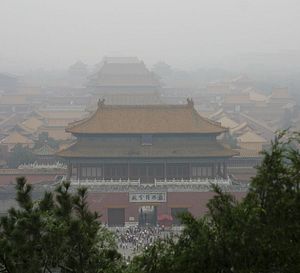Hundreds of thousands of residents living in northern China are suffering the “coldest” winter in decades. But it’s a man-made disaster rather than a natural one, simply because the Chinese authorities have imposed a strict ban on coal-heating.
The ban stemmed from a well-intentioned purpose: to reduce air pollution. But it’s left houses, schools, and factories without heat as winter sets in.
For years, people across China have been complaining about the increasingly thick smog hanging over the sky. A study in 2015 showed that air pollution killed about 1.6 million people every year in China. Several cities even broke out in small scale protests against air pollution. The lethal smog turns particularly serious in northern China every winter, since households as well as factories in those areas tend to use coal as their major heating fuel.
In response, China declared a war against air pollution and launched a series of policies to address various environmental problems. As The Diplomat reported earlier, in 2013, the State Council even issued an “Air Pollution Prevention and Control Action Plan,” specifying detailed targets for air quality and demanding that by the end of 2017, northern China should generally get rid of the coal-heating system and use natural gas instead.
However, the effect of these policies seemed limited. The Chinese Ministry of Environmental Protection admitted in October that air quality targets may be hard to met by 2017.
The ban on coal-heating in northern China is now in place, yet, the gas-heating system isn’t. Many provinces, including Shandong, Shanxi, Shaanxi, Hebei, Henan, and Tianjin, have issued strict regulations to prevent local residents from burning coals Thousands of families, schools, and factories in northern China are now left shivering in the cold without any heating system.
Chinese media outlets in various provinces have reported the poor situation of local residents — particularly those living in rural areas — during the freezing winter.
For example, many students in Hebei villages have to study outdoors, since the meager winter sunlight is their only source of heating. A construction worker in Shanxi was arrested for warming himself by burning coal outside; a peddler was arrested in Shanxi for selling coal to local villagers; and multiple villagers were fined for burning coal at home.
More netizens have been posting stories of their suffering on Chinese social media. But such posts are deleted by Chinese censors without any explanation.
Even China’s state media has stood up to voice its support for the poor. China Daily published an editorial condemning local governments for being “too hasty in implementing” the coal-to-gas policy. Global Times, the traditionally pro-government newspaper, also published a commentary arguing that “The state’s coal-to-gas project doesn’t mean freezing people.”
It’s worth noting that these state media outlets uniformly blamed local governments’ flawed implementation, while defending the central government’s “laudatory policy.”
Yet the truth is that the central government put extremely heavy pressure on these local officials in the first place. As The Diplomat reported earlier, in September, the Ministry of Environmental Protection mandated that all governors of local districts or counties in northern China will be held responsible for the air quality.
“No sloth in work or negligence is allowed. If you don’t work hard to implement your responsibility, you’d be held responsible,” the ministry said at that time.































